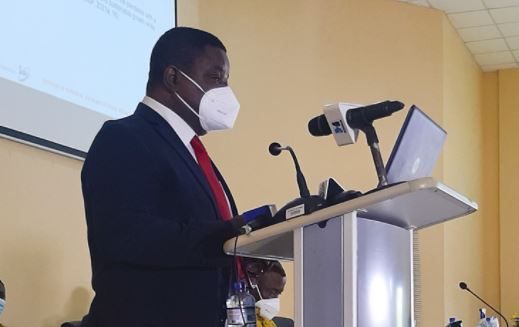Professor Peter Quartey, an Economist and Director of the Institute of Statistical, Social and Economic Research (ISSER), has stated that the pandemic has taught Ghana the need to have up-to-date real-time data. According to him, this is one of the major lessons that the country should learn from the outbreak of the pandemic.
“Yes, certainly, the pandemic has taught us not just to have reliable data but having up-to-date real-time data”.
Discussing the role of quality data in economic development with The Vaultz news, Professor Quartey asserted that data plays a significant role in the development of every economy. He pointed out that one of the major uses of census data is planning. According to him, the government requires census data to plan its policies and programs.
Also, he highlighted that the pandemic has exposed the country’s limited and unreliable data that can aid policymaking. He cited the government’s distribution of food to vulnerable and poor persons during the lockdown as an example. He argued that the food distribution could have been more effective if the country had up-to-date data on vulnerable households.
Furthermore, he pointed out that once the country has reliable and up-to-date data, it can roll out various interventions in times of emergencies. Prof. Quartey also stated that the pandemic has highlighted the need to employ technology in collecting and storing data.
Census in a pandemic-ridden economy
Meanwhile, the discussions come on the backdrop of the upcoming 2020 Population and Housing Census.Even though he lamented the cost of the census, Professor Quartey hailed the GSS’ decision to undertake the census amid the pandemic. He pointed out that it is always good to conduct census at regular intervals. According to him, this will help track the changes in the population structure over the years.
Besides, the ISSER Boss highlighted that to every nation, census data is very critical in its development. He pointed out that the data gives the government an estimate of how much it should invest in the various sectors. Some of which include health, education, housing, social security among others.
Also, Prof. Quartey noted that several institutions and individuals make use of census data. He pointed out that the donor community also makes use of the data. He cited the World Bank and IMF as some institutions whose decisions to help the country is anchored on such data. Besides, he stated that the information is also very useful to households as it helps people plan their families.
Moreover, the Government Statistician, Prof. Samuel Kobina Annim has revealed that the 2020 Population and Housing Census will cost GH¢521.3 million. This is an upward revision from GH¢500 million announced earlier due to COVID-19. Commenting on the budget, Prof. Quartey indicated that the census is quite expensive. Even though, he acknowledged that “census is always very expensive”.
According to him, the government will have to make provisions for the procurement of PPEs and the observance of COVID-19 protocols. However, he pointed out that donor support is always critical in undertaking the country’s census.
Quality of Economic Data
On the whole, Prof. Quartey revealed that the quality of economic data collected in Ghana is good. However, he called for an improvement in the quality of data in the country.
“The quality is good although there is still room for improvement”.
Besides, he is very optimistic that the use of tablets to collect the data will help the GSS to obtain real-time data that is devoid of errors. He added that even if there will be errors, their occurrence will be minimized. According to him, the use of technology in data collection helps to monitor the enumerators and the data collection process. This ensures that people do not sit in the comfort of their homes to fill out the questionnaires. real-time real-time real-time
READ ASLO: We are trying to change our operational processes for easier filing of taxes- GRA



















